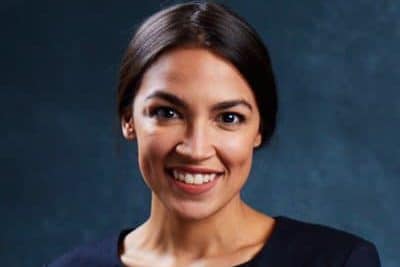Rising Democratic star Alexandria Ocasio-Cortez, the congressperson-to-be for a district in the Bronx and Queens, famously tweeted “This is a massacre,” after Israel’s slaughter of 60 Gazans on May 14, and said Democrats must not be silent anymore about Israeli human rights violations, and opposed the embassy move. Since her surprise victory over a Democratic leader in the primary last month, she’s gotten a lot of pushback from the establishment.
More came on Friday night on PBS Firing Line, and Ocasio-Cortez seemed to walk back her comments. She wrote that tweet as an “activist,” she said—she’s not an activist anymore, now she’s about to be a congressperson representing a broad district (with many Zionist Jews in it), and she promised to “learn and evolve.” Ocasio-Cortez vowed that she supports the two-state solution, she seemed flustered when asked why she used the term “occupation,” and she apologized for herself, saying that she’s not an expert on Middle East issues. “I may not use the right words.”
Here’s the three-minute exchange. Margaret Hoover, a veteran of the Bush White House who is also a supporter of some liberal causes, says that Ocasio-Cortez’s “massacre” tweet became controversial, then asks:
What is your position on Israel?
AOC: Well, I believe absolutely in Israel’s right to exist. I am a proponent of the two state solution. And for me this is not a referendum I think on the state of Israel. For me, the lens through which I saw this incident, as an activist, as an organizer: If 60 people were killed in Ferguson, Missouri, if 60 people were killed in the South Bronx–unarmed–60 people were killed in Puerto Rico, I just look at that incident more through–through just, as an incident and to me it would just be completely unacceptable if that happened on our shores. But–
Of course the dynamic there in terms of geo politics and the Middle East is very different from people expressing their First Amendment right to protest.
AOC: Well, yes, but I also think that what people are starting to see in the occupation of Palestine is just an increasing crisis of humanitarian conditions and that to me is just where I tend to come from on this issue.
You use the term the occupation of Palestine, what did you mean by that?
AOC: Oh–I think, what I meant is that the settlements that are increasing in some of these areas and places where Palestinians are experiencing difficulty in access to housing and homes.
Do you think you can expand on that?
AOC: Yeah I think—I am not the expert on geo-politics on this issue. You now, for me, I’m a firm believer in finding a two-state solution in this issue [Hoover nods approvingly]. And I’m happy to sit down with leaders on both of these… for me, I just look at things through a human rights lens, and I may not use the right words–I know this is a very intense issue.
That’s very honest and you’re gong to—and when you get to Washington and you’re an elected member of Congress you’ll have an opportunity to talk to people on all sides and visit Israel and visit the West Bank.
AOC: Absolutely. And especially with the district that I represent, I come from the South Bronx, I come from a Puerto Rican background. And Middle Eastern politics is not exactly at my kitchen table every night. But I also recognize that this is an intensely-important issue for people in my district, for Americans across the country. And I think at least what is important to communicate is that I am willing to listen. And that I’m willing to learn and evolve on this issue as I think many Americans are.
Ocasio-Cortez is just 28 and it shows. Give her a couple years and I am sure she will show more firmness and strength on these answers. Oh, and wait till she visits “Israel and… the West Bank.”
Thanks to Ofer Neiman.

